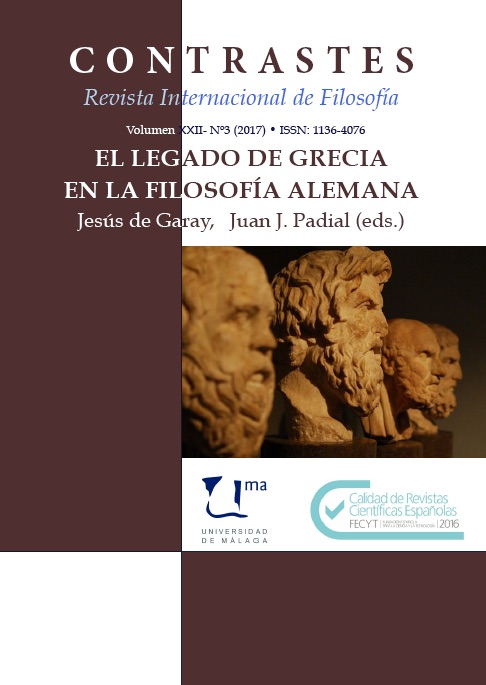Plato in Germany Some remarks on the reception of the platonic doctrine of ideasin Kant and Wieland
DOI:
https://doi.org/10.24310/Contrastescontrastes.v22i3.3754Keywords:
Plato; ideas; Kant; athematic knowledge; use-knowledgeAbstract
In this article I unfold, first, the Kantian critic of platonic ideas in order to show the traditional interpretative presupposition according to which ideas in Plato are to be understood as an objective correlate of an intuition. Next, I develop in general terms the hermeneutical limits of such interpretation, showing that this does not make justice to the non-objectivist forms of knowledge introduced by Plato as the locus in which ideas are originary understood. Finally, I present the fundamentals of Wieland’s non-objectivistic interpretation of platonic ideas and their knowledge.
Downloads
Metrics
Publication Facts
Reviewer profiles N/A
Author statements
Indexed in
-
—
- Academic society
- N/A
- Publisher
- Universidad de Málaga
References
ANNAS, J. 2001: «Moral Knowledge as Practical Knowledge.» Social Philosophy and Policy, 18 (2), 236.
FISTIOC, M.C. 2002: The Beautiful Shape oft he Good: Platonic and Pythagorean Themes in Kant’s Critique oft he Power of Judgement. New York & London: Routledge.
KANT, I, Crítica de la razón pura, tr. M. Caimi. México D.F.: Fondo de Cultura Económica, , 2011.
KIM, A. 2010: Plato in Germany. Kant-Natorp-Heidegger. Sankt Augustin: Academia Verlag.
NEHAMAS, A. 1992: «What Did Socrates Teach and to Whom Did He Teach It?», The Review of Metaphysics, 46 (2), 279–306.
NUSSBAUM, M. C. 2001: The fragility of goodness: luck and ethics in Greek tragedy and philosophy. Cambridge: Cambridge University Press.
ROOCHNIK, D. 1996: Of Art and Wisdom Plato’s Understanding of Techne. Penn State University Press.
TRABATTONI, F. 2010: «Il sapere del Filosofo» en VEGETTI, M. 2010: Platone. La Repubblica, vol. V, Napoli: Bibliopolis, pp. 151–186.
VAN ACKEREN, M. 2003: Das Wissen vom Guten: Bedeutung und Kontinuität des Tugendwissens in den Dialogen Platons. Amsterdam: Grüner.
WOODRUFF, P. 1990: «Plato’s Early Theory of Knowledge», en S. EVERSON (ed.), Epistemology. New York: Cambridge University Press, pp. 60–84.
WIELAND, W. 1999: Platon und die Formen des Wissens. Göttingen: Vandenhoeck und Ruprecht.
Downloads
Published
How to Cite
Issue
Section
License
This journal provides immediate free access to its content under the principle of making research freely available to the public. All content published in Contrastes. Revista Internacional de Filosofía, are subject to the Creative Commons Attribution-NonCommercial-ShareAlike 4.0 license whose full text can be found at <http://creativecommons.org/licenses/by-nc-sa/4.0>
It is the responsibility of the authors to obtain the necessary permissions of the images that are subject to copyright.
Authors whose contributions are accepted for publication in this journal will retain the non-exclusive right to use their contributions for academic, research and educational purposes, including self-archiving or repository in open access repositories of any kind.
The electronic edition of this magazine is edited by the Editorial Service of the University of Malaga (Uma Editorial), being necessary to cite the origin in any partial or total reproduction.










5.png)
